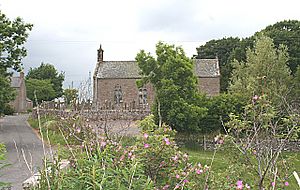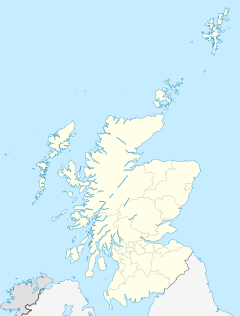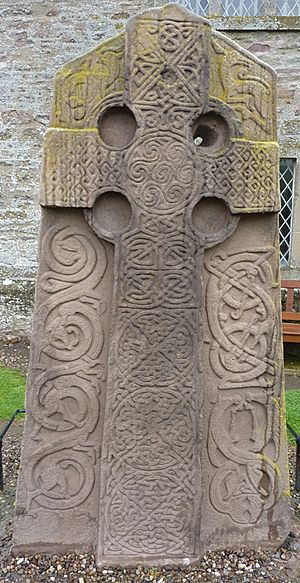Aberlemno facts for kids
Quick facts for kids Aberlemno
|
|
|---|---|
 Aberlemno Kirk |
|
| Population | 544 (2011 Census) |
| OS grid reference | NO521558 |
| Council area | |
| Lieutenancy area | |
| Country | Scotland |
| Sovereign state | United Kingdom |
| Post town | FORFAR |
| Postcode district | DD8 |
| Dialling code | 01307 |
| Ambulance | Scottish |
| EU Parliament | Scotland |
| UK Parliament |
|
| Scottish Parliament | |
Aberlemno is a small village and a local area (called a parish) in Scotland. It is part of the Angus region. The village is well-known for its amazing ancient carved stones. These stones were made by the Picts, who lived in Scotland many centuries ago.
In 2011, about 544 people lived in the Aberlemno parish.
A type of fossil plant was first found near Aberlemno. Because of this, scientists named the plant Aberlemnia after the village.
A famous Scottish-American poet and writer named James Mackintosh Kennedy was born in Aberlemno in 1848. He loved reading books that were lent to him by the local church. This helped him become interested in literature.
Between 1961 and 1968, a special underground bunker was located in Aberlemno. It was used by the Royal Observer Corps to watch for things like aircraft. The bunker is still mostly there and was being fixed up in 2015.
Contents
Discovering Aberlemno's Ancient Stones
Aberlemno is famous for its four early Medieval standing stones. There is also a fifth stone from Aberlemno. You can see it at the McManus Galleries in Dundee.
What Are Pictish Stones?
The Pictish stones are large stones with carvings on them. They were made by the Picts, an ancient group of people who lived in Scotland. These stones often show symbols, animals, and sometimes Christian crosses.
Where to Find the Stones
Three of the stones are located near the B9134 road that goes between Forfar and Brechin. One of these is a broken piece of a stone. The fourth stone, called the Kirkyard Stone, is in the graveyard of the local church.
Protecting the Stones
You can see the stones from spring to autumn. But during the winter, they are covered with wooden boxes. This protects them from frost and bad weather.
 | Selma Burke |
 | Pauline Powell Burns |
 | Frederick J. Brown |
 | Robert Blackburn |



